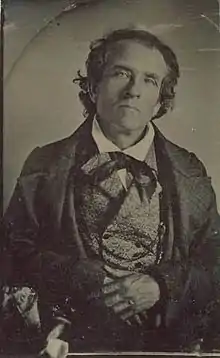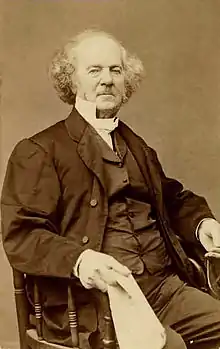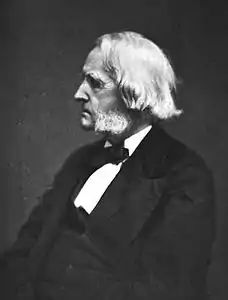The Emancipator
The Emancipator (1833–1850) of New York City (later Boston) was an American abolitionist newspaper. It was the official newspaper of the American Anti-Slavery Society (AASS). From 1840 to 1850 it was published by the Liberty Party and changed names several times as it merged with other abolitionist newspapers in Boston.

History
The Emancipator was founded in March 1833 in New York City by Arthur Tappan (1786–1865), a wealthy abolitionist. Until 1836, it was the official publication of the American Anti-Slavery Society (AASS). From 1836 to 1840, the editor was Theodore Dwight Weld. After Weld left this position, Joshua Leavitt succeeded him as editor.
After the American Anti-Slavery Society split in 1840, The Emancipator became a publication of the Liberty Party and Leavitt continued as the editor of the newspaper until 1848. The newspaper underwent several name changes between 1840 and 1848 as it slowly merged with other abolitionist newspapers located in Boston. These publications were continually exponents of abolitionism.[1]
Contributors included Lewis Tappan (1788–1873) of the Amistad case, James McCune Smith (1813–1865) who also co-edited The Colored American, Joseph Cammett Lovejoy (1805–1871), Samuel Edmund Sewall (1799–1888), Henry Brewster Stanton (1805–1887), Joseph Cammett Lovejoy, Horace Edwin Smith (1817–1902), William Ellery Channing (1818–1901), and William Stevens Robinson (1818–1876)[2]
Timeline
Editors
| 1833–1834 | The Emancipator was founded in New York City in March 1833 under the editorship of Charles Wheeler Denison (1809–1881). The March 1833 publication marked the beginning of the abolitionist movement in New York state.[3] |
| 1834–1835 | William Goodell (1792–1878), editor |
| 1836 | Amos Augustus Phelps (1805–1847), editor |
| 1836–1840 | Theodore Dwight Weld (1803–1893), editor |
| 1840–1841 | Joshua Leavitt (1794–1873), editor |
| 1840 | The American and Foreign Anti-Slavery Society splintered from the AASS. The Emancipator then became Leavitt's personal publication and a leading journal of the Liberty Party.[4] |
| 1841–1844 | The publication is merged with The Free American, the official newspaper of the Massachusetts Abolition Society, and was published as weekly The Emancipator and Free American. Joshua Leavitt (New York) and Elizur Wright (Boston) served as co-editors until March 1842, when Wright left and it was published only in Boston. |
| 1844–1845 | Retitled The Emancipator and Weekly Chronicle. John Greenleaf Whittier (1807–1892) contributed as editor for a short period in 1844. |
| 1945–1948 | Retitled The Emancipator. Leavitt continued as editor until March 1848, when replaced by Curtis C. Nichols (1814–1896). |
| 1848 | Briefly retitled The Emancipator and Free Soil Press, organ of the Free Soil Party. |
| 1848–1850 | Retitled Emancipator & Republican with editor Henry Wilson (1812–1875) followed by Lucius Edwin Smith (1822–1900)[2] |
Publishers
| The Emancipator | |
| 1835–1841 | Robert G. Williams (né Ransom Goss Williams; 1811–1851), publisher in New York City[5] |
| 1845–1848: | Rev. Hiram Cummings (1810–1887), publisher in Boston[6] |
| Emancipator & Republican | |
| 1849 | Henry Wilson, publisher in Boston, February 9, 1849 – August 16, 1949 |
| 1849–1850 | Wilson & Bent[7] – Henry Wilson and John Bent (1809–1882), publisher in Boston, August 23, 1849 – December 26, 1850 |
Agents
In 1833, African-American agents selected to represent the publication included:
- David Ruggles (1810–1849), New York City, who was the general agent
- John D. Closson, Newark, New Jersey
- Thomas Van Rensslear (1800 – c. 1850), Princeton, New Jersey
- Abraham Doras Shadd (1801–1882), Pennsylvania
- John Carlisle, Pennsylvania
David Ruggles, who was bookseller and publisher, advertised for additional agents to distribute anti-slavery newspapers.[8]
See also
- Abolitionist publications
- New York Manumission Society
- American Anti-Slavery Society
- American and Foreign Anti-Slavery Society
- Boston Female Anti-Slavery Society
- Massachusetts Anti-Slavery Society
- Boston Vigilance Committee
- Fall River Female Anti Slavery Society
- Pennsylvania Anti-Slavery Society
- Philadelphia Female Anti-Slavery Society
- Vigilant Association of Philadelphia
- Ohio Anti-Slavery Society
Literature
- Vaughn, Stephen L. (ed.). Encyclopedia of American Journalism. Routledge (2009) pps. 4–5 ("Abolitionist Press: Newspaper Chronology"); OCLC 759036346 (digital format)
Extant holdings, re-prints, and digital facsimiles
- The Emancipator (1820)
- Benjamin Harrison Murphy (1889–1878) (1932 re-print); OCLC 1019811804, 191233606, 173718223; 82972841
- Genius of Universal Emancipation
- Genius of Universal Emancipation and Baltimore Courier
- The Genius of Universal Emancipation and Quarterly Anti-Slavery Review (1837–1839)
- The Emancipator (–1834)
- The Emancipator, and Journal of Public Morals (1834–1835)
- The Emancipator (1833–1848)
- The Emancipator (1835–1840)
- The Emancipator (1845–1848)
- Emancipator and Free American (1842–1844)
- Emancipator and Weekly Chronicle (1844–1845)
- Filmed from the New York Public Library (microfilm); OCLC 32651724
- Emancipator and Free Soil Press
- Emancipator & Republican
- Microfilm; OCLC 38872229
- Gale (online); OCLC 1100208152, 723812372
- Serials Solutions (online); OCLC 1060831572
- Note: The shortlived Commonwealth and Emancipator, launched in 1851, had no connection to the Emancipator & Republican. It was first published in Boston January 4, 1851 (Vol. 1, No. 1) – William S. Damrell & Co. (publisher) and Joseph Lyman (editor).
Gallery











.jpg.webp)

 David Ruggles
David Ruggles
(center)
Controversy
In a nationally publicized spectacle, a Tuscaloosa County, Alabama, grand jury issued a true bill on October 25, 1835, against Robert G. Williams, agent and publisher of The Emancipator, for allegedly "circulating seditious pamphlets in Alabama" ... "tending to excite our slave population to insurrection and murder." On November 14, 1835, the Alabama Governor, John Gayle (1772–1859) demanded the New York Governor, William Learned Marcy (1786–1857), to extradite Williams, "a fugitive", to stand trial. Marcy refused.[9]
References
- Mielnik, Tara Mitchell (1 January 2010). "The Emancipator". Tennessee Encyclopedia of History and Culture. University of Tennessee Press. Retrieved 23 January 2014.
- Encyclopedia of African American History, (Vol. 1 of 3), Leslie M. Alexander, PhD, Walter C. Rucker, PhD (eds.), ABC-CLIO (2010); OCLC 758736958, 10352375
- "New York and the National Slavery Problem," by Leo H. Hirsch, Jr., The Journal of Negro History, Vol. 16, No. 4, October 1931, pps. 454–473 (accessible via JSTOR)
- "The Fight Against the Gag Rule: Joshua Leavitt and Antislavery Insurgency in the Whig Party, 1839–1842," by James M. McPherson, PhD (born 1936), The Journal of Negro History, Vol. 48, No. 3, July 1963, pps. 177–195 (accessible via JSTOR)
- "About The Emancipator (New-York) 1835–1841," Library of Congress
- "About The Emancipator (Boston) 1845–1848," Library of Congress
- Boston Post, August 16, 1849, p. 2 (accessible via Newspaperarchive.com, subscription required)
- The EmancipatorVol. 1, No. 6, June 8, 1833, p. 21
Vol. 2, No. 19, May 13, 1834
Vol. 2, No. 21, May 17, 1834
Vol. 2, No. 32, August 12, 1834 - "Refuge of Oppression," "The Liberator, January 23, 1836, p. 1 (accessible via Newspapers.com, subscription required)